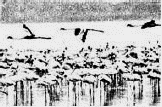题型:阅读选择 题类:常考题 难易度:普通
天津市南开区2016年九年级上学期英语期末考试试卷
阅读短文,从每题所给的四个选项(A、B、C和D)中,选出最佳选项。
Some of the greatest problems we face today are the destruction (破坏) of our environment. Brown clouds, polluted water, endangered wild animals.., these problems seem so huge.
So my family does what we can. We take cloth bags to stores instead of using plastic bags. We walk where we don't have to drive...
But does it do any good? When I am the only one in line at the market with cloth bags, am I doing any good? Does my walking to stores make any real difference to the world?
I recently learned something about flamingos (火烈鸟) which like to get together in groups of a thousand or more. Every year, when the time comes for migration (迁徙), a few of them first takeoff from the lake. But none of the others seem to notice, so the small group returns.

However, the next day they try again. This time few more fly along with them, but most of them still pay no attention, so they return again. They try for several times. Every time a few more birds join in but, since the thousands of others still take no notice, the great migration plan is once more stopped.
Then one day something changes. The same small group of birds once again starts flying and a small number more join in just as before, then more. Finally, they all take flight and the migration really begins.
What a spectacular sight it must be—thousands of flamingos taking off into the sky at once!
A few can make a difference. Even if you're the one to take the first step, and continue trying, others will someday take notice and together we will solve even our greatest problems.
试题篮